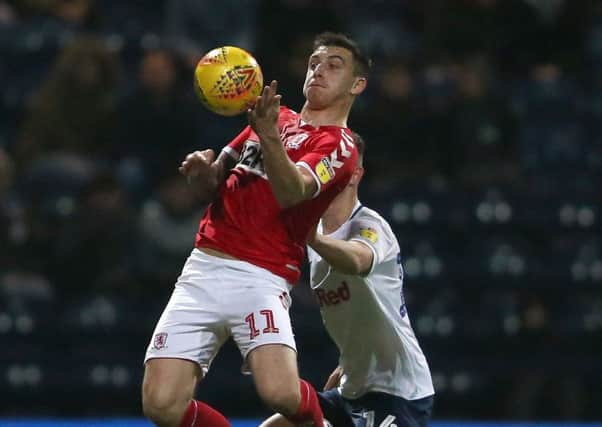Dave Seddon’s PNE pressview: Wages the big challenge for Preston and all the clubs in the ‘bear pit’ of the Championship


There were few surprises contained within the 22-page document which was filed with Companies House last weekend.
PNE’s profit after tax was £1.9m, not a huge amount in the grand scheme of things but decent all the same.
Advertisement
Hide AdAdvertisement
Hide AdThe fact they were able to show a profit was down to the sale of Jordan Hugill in January 2018 to West Ham.
Otherwise, the balance sheet would have shown a loss of £7m.
The report for the year ending June 2018 showed Trevor Hemmings had put in an interest-free loan of £5.6m – since that year end, a further loan of £4.1m had been made by the North End owner.
The debt owed to him now stands at £36m.
Twelve clubs in the Championship in the 2017/18 season, the campaign which is covered by these figures, have a bigger debt than that of PNE to Hemmings.
Advertisement
Hide AdAdvertisement
Hide AdA line on the opening summary page of the club’s financial report, was to sum things up well.
It read: “Operating cash flow continues to be adverse as the club has contracted a squad with wages which are high in comparison to its revenue.
“The company has therefore been reliant on the financial support of its shareholder.”
What caught my eye was the wage bill, not just here at Preston but throughout the Championship.
Advertisement
Hide AdAdvertisement
Hide AdIn the period covered by this set of figures, North End paid out £15m in wages and associated social security costs.
It’s a tidy figure, up from £13.4m the previous year.
And there is the drain on clubs at this level – the cash spent on salaries.
Transfer fees can be paid in instalments but wages are the constant outgoing.
North End’s wage bill is actually modest within the Championship.
Advertisement
Hide AdAdvertisement
Hide AdIn 2017/18, the combined wages paid out by clubs at this level was £635m.
That is the price of either trying to climb out of the Championship and into the Premier League, or merely trying to be competitive in the division.
Last season, Brentford, Millwall, Barnsley and Burton were the four clubs who had a lower wage bill than North End.
The fact that PNE finished seventh in the table shows they got value for money – and more – for the salaries paid out.
Advertisement
Hide AdAdvertisement
Hide AdAt the other end of the scale, Aston Villa paid their players and staff £61m in wages, Middlesbrough £49m.
Cardiff parted with £48m in wages and also promotion bonuses.
Norwich’s wage bill last season was £42m, while for Birmingham it was £39m.
Fulham, who reached the Premier League via a win in the play-offs, spent £37m paying their players.
Advertisement
Hide AdAdvertisement
Hide AdAfter last week’s 1-1 draw at Deepdale, Bristol City head coach Lee Johnson talked of ‘fishing in the same pond’ as Preston in terms of looking for a similar type of player.
Interestingly, City’s wage bill in 2017/18 was £27m.
If they are fishing in the same pond, the Robins must have a bigger rod and net.
That is the Championship for you, it is the bear pit of the top four divisions in English football.
It’s a scrap, an unrelenting battle of Saturday-Tuesday football with the biggest of prizes awaiting the three most successful clubs.
Advertisement
Hide AdAdvertisement
Hide AdThat prize is the Premier League and all the cash which comes with it.
However, the reality when you get there is that half the clubs are involved in one big battle to avoid coming down.
You regularly take your turn as being the last game on Match of the Day.
Use the money which is delivered almost by the wheelbarrow load, sensibly and a club can be stable for years to come.
Advertisement
Hide AdAdvertisement
Hide AdHistory does show though, that many clubs are often not sensible and hit some real financial problems when the trapdoor from the top flight falls open.
Turning the focus back on Preston, when the next set of financial figures are reported in 12 months time, in all likelihood the wage bill will have risen again.
Upping the salaries is one way of keeping hold of some of the young talent which they have in their squad.
As for matters on the pitch, North End’s visit to Blackburn will see a mass of PNE supporters hit the A677 and M65.
Advertisement
Hide AdAdvertisement
Hide AdWhatever the exact final ticket sale figures are, to have approaching 7,500 fans make the trip is impressive to say the least.
Okay, Ewood Park isn’t at the other end of the earth, but it is a huge percentage of the fan base making the trip.
The Bristol City game here last week attracted a crowd of 12,863, with 11,993 home fans.
To have 7,000 plus of them in the Darwen End is some going.
Down the years, in my time as both as a fan and then in this reporting capacity, I have always felt PNE’s away support has been a strength of the club.
Even in the tough times of the 1980s, an away support of a few hundred could be guaranteed – distance didn’t seem to matter.